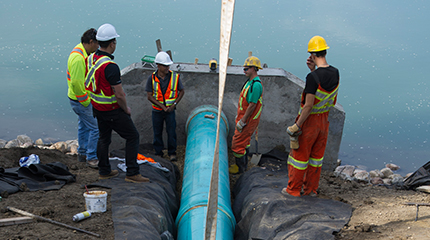As Edmonton City Council prepares to vote on the transfer of the city’s drainage utility to EPCOR, a report from the Edmonton and District Labour Council (EDLC) has challenged the benefits of the proposed transfer, claiming the public utility could achieve much of EPCOR’s proposed efficiencies.
Described as an exercise in weighing trade-offs, the EDLC’s report lays out factors that it believes city councillors and members of the public should consider before granting approval to the transfer.
Authored by Robin Shaban, a researcher and policy analyst, and Barrett Weber, a consultant, the report points to two factors that the EDLC believes should be considered by city councilors, which include the efficiencies that EPCOR has suggested will result from the transfer and whether the city could achieve the same efficiencies. The report also questions issues of transparency and accountability.
EPCOR’s proposal indicated that it could reduce drainage operating costs by $5 million over 5 years. Further, EPCOR’s proposal suggests it would deliver lower drainage rates than the city and that it has sufficient finances to address system growth, aging infrastructure, and flood mitigation. And, ultilatemy, it EPCOR stated they will be able to generate and sustain an additional $20 million to the annual dividend. In 2015, EPCOR paid the City a $141 million dividend.
EDLC argues that if EPCOR fails to generate these efficiencies, then the city risks earning significantly less compensation from the proposed transfer. By comparing claimed, revised, and net operational efficiencies, EDLC also makes a case that the city could reasonably generate 93 per cent of the operational efficiencies that EPCOR has suggested it could achieve by taking control of the drainage utility.
Courtesy, Edmonton and District Labour Council.
The report also addresses concerns regarding transparency and accountability. The authors state that, “past transfers of City utilities to EPCOR have brought to the forefront concerns regarding transparency and accountability.”
In response, EPCOR spokesperson Tim LeRiche told the CBC, “We are prepared to meet any requirements of city council in regards to transparency and accountability.” LeRiche also encouraged councilors and citizens to read the 2106 EPCOR Proposal for Drainage Transfer Analysis, which was conducted by Grant Thornton. The Grant Thornton report found that “Based on the analysis presented in this document, EPCOR’s Proposal to transfer Drainage continues to have the potential to yield net benefits to the City, taxpayers, and ratepayers.”
Courtesy, City of Edmonton & Grant Thornton.
Edmonton City Council will discuss the utility transfer to EPCOR in today’s council meeting.
Both the Edmonton and District Labour Council and the Grant Thornton reports are available online.











